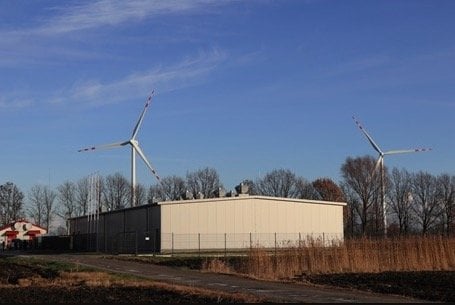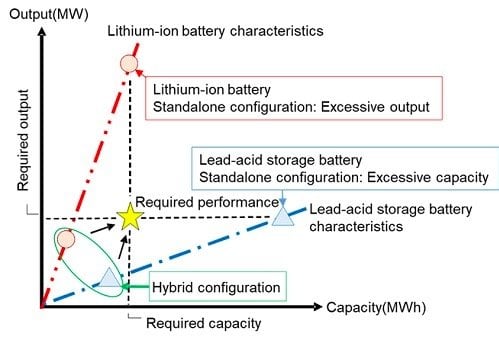Poland's largest hybrid battery energy storage system commence full-scale technology demonstration
Increasing the power grid security and facilitating the introduction of renewable energy through a hybrid battery energy storage system.

Figure 1. The hybrid BESS building installed next to the Bystra Wind Farm
New Energy and Industrial Technology Development Organization ("NEDO") and its project partners Hitachi, Ltd. ("Hitachi"), Showa Denko Materials Co., Ltd. ("Showa Denko Materials") and Sumitomo Mitsui Banking Corporation ("SMBC") announced today that the Smart Grid Demonstration Project in Poland, aimed at the expansion of renewable energy with a hybrid battery energy storage system (BESS) located at the Bystra Wind Farm in northern Poland reached monitoring phase in June and full-scale demonstrative operation phase on Sep. 25.
The project is supported by the Ministry of Climate of the Republic of Poland and has been carried out in cooperation with Polish project partner companies: Polskie Sieci Elektroenergetyczne S.A. ("PSE"), Energa Operator S.A. ("EOP") and Energa OZE S.A. ("EOZE"). The project aims to contribute to further integration of renewable energy in Poland by achieving secure power grid operation while minimizing investment costs for power transmission equipment at the same time. This is the next step following the introduction of a Special Protection Scheme (SPS) system, which entered into operation in October 2019, increasing the security of grid and protecting power system.
This hybrid BESS is Poland's largest-scale battery energy storage system, which combines high-output lithium-ion batteries with high-capacity lead-acid storage batteries, a combination to obtain high performance at low cost. The test operation will validate and prove the effectiveness of the functionality for alleviating short-term fluctuations in wind power generation and for providing necessary reserve power for adjusting demand-supply balance ("load balancing").
Demonstration Project Overview
In response to the EU directives, Poland is planning to increase the renewable energy usage and is aiming to introduce large amounts of wind power generation, particularly in the country's northern regions, which are fortunate in terms of wind conditions. At the same time, there is a capacity limitation of transmission lines to facilitate the introduction of large amounts of wind power generation, and the country's pumped-storage hydroelectric power plants - which are used for load balancing - may be insufficient.
Along with the introduction of large amounts of wind power generation, the risk of the grid destabilization and the shortage of load balancing capabilities become an issue, generating a need for a system that will stabilize the power grid while at the same time suppressing economic burden and enabling the introduction of large amounts of wind power generation and other renewable energies.
With the above background, in March 2017, NEDO concluded a Memorandum of Understanding (MOU) with the Ministry of Energy in Poland (currently the Ministry of Climate) for "The Demonstration Project for Applying Special Protection Scheme in Poland" intended to enable the expansion of renewable energy in Poland1.
At the same time, three contractors chosen for the project implementation by NEDO, namely Hitachi, Showa Denko Materials and SMBC, conducted on-site surveys and designed, manufactured, transported, and installed equipment, and commenced its test operation in cooperation with PSE (the transmission system operator in Poland), EOP (a power distribution system operator in northern Poland) and EOZE (a power generation company in Poland). These efforts led to the start of the demonstration operation of the SPS, a power grid protection system, on October 1, 20192.
Subsequently, NEDO, the above mentioned contractors, and the cooperating companies also completed the installation of the hybrid battery energy storage system (BESS) at the Bystra Wind Farm in northern Poland and commenced full-scale demonstration operation on Sep. 25.
The hybrid BESS introduced in this demonstration project consists of high-output lithium-ion batteries (1 MW-0.47 MWh) and high-capacity lead-acid storage batteries (5 MW-26.9 MWh) manufactured by Showa Denko Materials, the BESS-DCS (Distribution Control System) manufactured by Hitachi, which allows hybrid control of these two types of storage batteries, and the PCS (Power Conversion System), a 6 MW power converter manufactured by Hitachi ABB Power Grids Ltd. The system is the largest-scale storage battery system in Poland, offering a high level of performance at low cost.
With the previously introduced SPS, PSE will control the hybrid BESS, operating it as a source of reserve power to adjust the demand-supply balance during normal operation and the BESS operator will be able to locally alleviate the effects of short-term fluctuations on the Bystra wind farm. The system will also be used to solve issues with transmission and high voltage distribution line overloads during a power grid failure. This will allow the wind power to be used with the maximum efficiency. In this demonstration project, NEDO and its partners will try to verify the effectiveness of various system functions, and contribute to increasing the ratio of wind energy and other renewable energy sources in Poland.
At the same time, Hitachi, Showa Denko Materials and SMBC will work together to develop business models in consideration of the possibility for wide-deployment of such systems and explore their finance schemes.
Details of Demonstration
Theme (1): Hybrid battery energy storage system (BESS) with support for wind power generation
[Entrusted companies: Hitachi, Showa Denko Materials]
Wind power generation is subject to fluctuations depending on the wind speed. For this reason, system operators must be able to alleviate the effects of short-term fluctuations in wind power output, and must also be able to supply appropriate reserve power to address the destabilization of the demand-supply balance brought about by fluctuations in the amount of power generated and grid output requirements.
In this demonstration, NEDO and its partners will use a hybrid BESS (see Figure 2) which combines two types of batteries - lithium-ion batteries with superior output characteristics and lead-acid storage batteries with low-cost per unit capacity - in an optimal configuration to deliver the required level of performance. Through optimal allocation and control of these batteries, the project will seek to validate the system's ability to perform the following functions during normal operation:
- Alleviation of the effects of short-term fluctuations in wind power generation
- Provision of frequency restoration reserve
- Provision of reserve power for load balancing
- Response to shifting power demand
- Price arbitrage
The demonstration will also seek to validate the possibilities of utilizing battery energy storage systems to eliminate or mitigate overloads of power transmission and distribution lines occurring as a result of power grid failure affecting the power flow, and in a wider scope as an alternative to grid augmentation.
Through the validation of these various functions, the project will evaluate the economic viability of hybrid BESS combining lithium-ion batteries and lead-acid storage batteries.

Figure 2. Illustration of the characteristics of hybrid BESS
Theme (2): Exploring business models and possibilities for the widespread adoption of power grid protection systems and battery energy storage systems
[Entrusted companies: Hitachi, Showa Denko Materials, SMBC]
The project will seek to clarify the advantages of power grid protection systems and the hybrid battery energy storage system and consider business models and finance schemes for these systems.
[Notes] 1News Release (March 17, 2017)
Smart Grid Demonstration Project in Poland to improve power system protection in case of high penetration of renewable energy」2News Release (Dec 3, 2019)
Power grid protection system starts its demonstration operation in Poland.
www.hitachi.com

